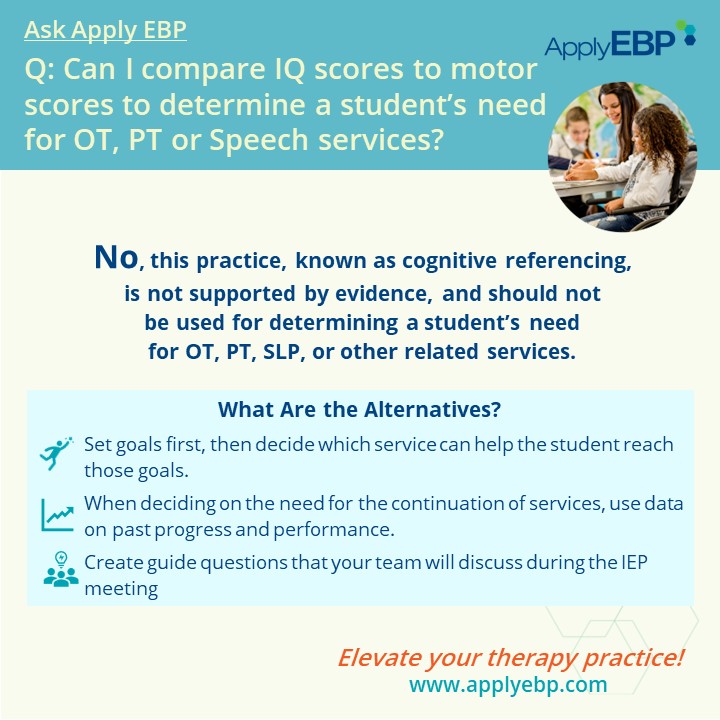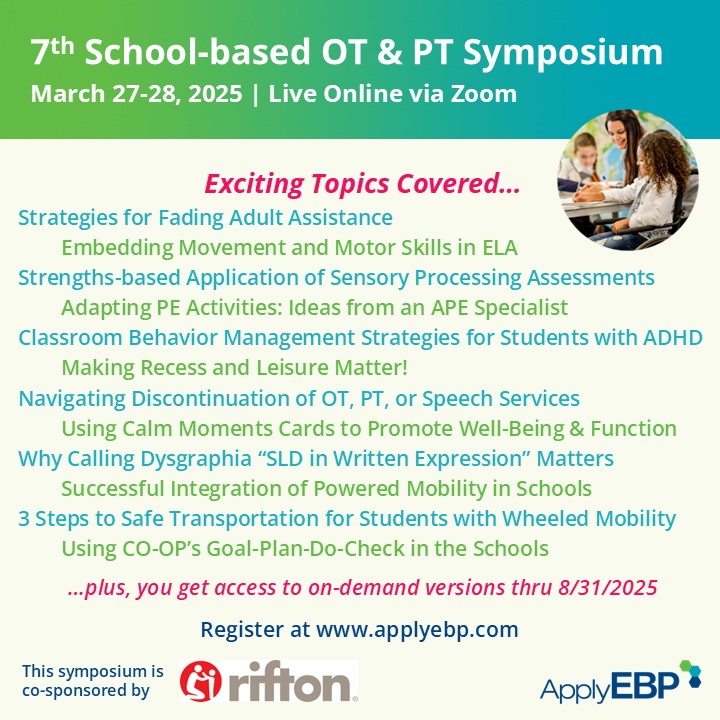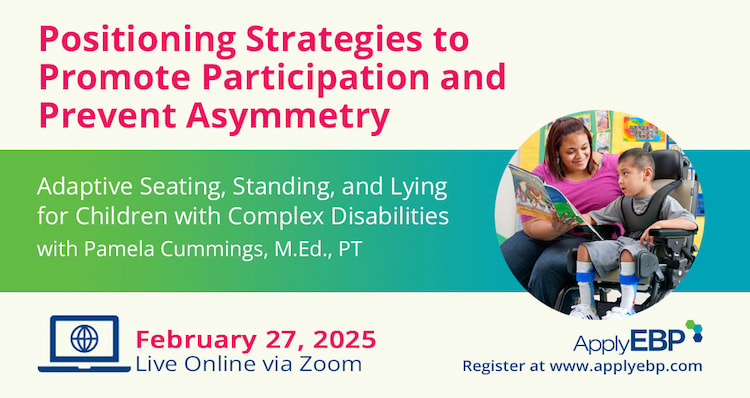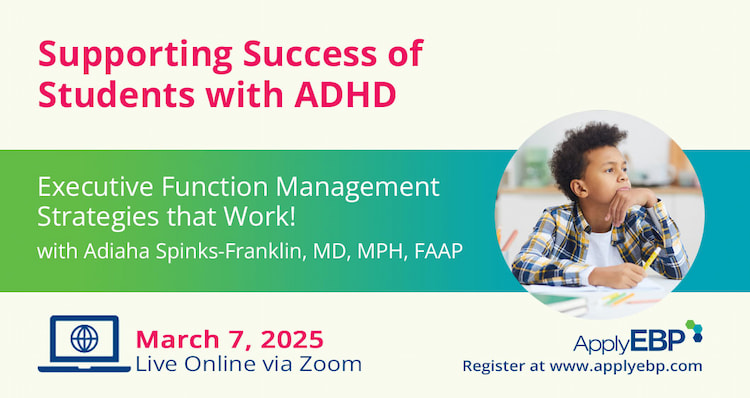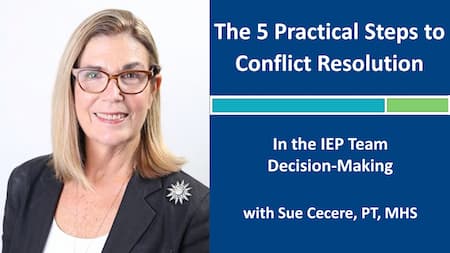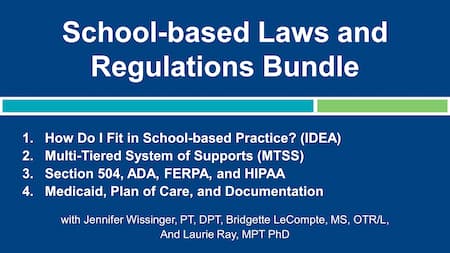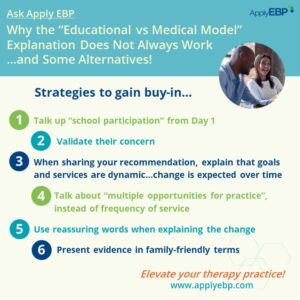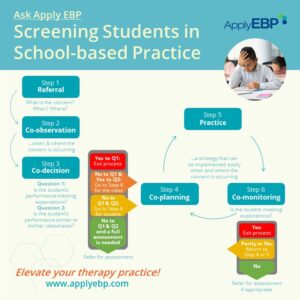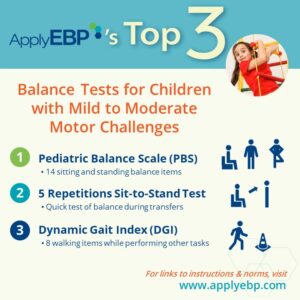Ask Apply EBP
Don't Use Cognitive Referencing When Deciding Need for Services
Q: Can I compare IQ scores to motor scores to determine a student’s need for services (OT, PT or Speech)?
A: No, this practice, known as cognitive referencing, should not be used for determining a student’s need for OT, PT, SLP, or other related services.
What is Cognitive Referencing?
Cognitive referencing (CR) is the practice of comparing Intelligence Quotient (IQ) scores to language scores (for Speech services) or motor scores (for OT and PT services) for determining eligibility for Speech, OT, or PT interventions.
Cognitive referencing basically suggests that language/motor skills cannot surpass cognition. Therefore:
-
-
- If there is no gap between IQ scores and language/motor scores, OT, PT, or Speech services are not needed because it assumes that the child’s current potential is met.
- If IQ is higher than language/motor scores, services are needed because it assumes that the child has potential to improve in language/motor skills commensurate with their IQ.
-
Cognitive Referencing Is Not Supported by Evidence
ASHA has long addressed the practice of cognitive referencing as not supported by evidence in their statement here. They report that “according to research, some language abilities may in fact surpass cognitive levels.”
In the OT and PT literature, 2 studies assessed the utility of cognitive referencing for determining need for OT and PT services: Bruce, et al (1998); Cole, et al (1991). Neither study found support for cognitive referencing
-
-
- Bruce, et al (1998) found no significant difference in progress with OT and PT services between students who started out with equivalent motor and cognitive skills, and students with higher cognitive than motor skills.
- Cole, et al (1991) even found the opposite of the cognitive referencing assumption: students with equivalent motor and cognitive skills progressed more than the students whose cognitive skills were higher than their motor skills.
-
These studies did not try to determine why CR was not supported in their studies. So, this part is a little bit of speculation of the reasons why:
-
-
- Development is not linear
- Development is individualized
- Lack of validity of using tests for this purpose
- Cognition, language, and motor skills co-develops and each can support the other. For example, better mobility can allow for more exploration of the environment, which can then lead to engagement in more cognitive activities.
- People have different strengths. They may be better in some skills than others.
-
In this paper by Notari, et al (1992), they discuss how cognitive reasoning is not in line with other theoretical frameworks (it is an interesting read!). Whatever the reason, what is clear from available research is that cognitive referencing is not a good decision-making tool for recommending services. It can set aside children who would actually benefit from services, or the other way around.
So, What Are the Alternatives?
Determining the need for related services should be individualized, based on the student’s educational needs. There is no easy-peasy shortcut for tackling this issue, but rather it should be an intentional process of decision-making by team. Here are 3 strategies that we recommend:
-
-
- Set goals first, then decide which service can help the student reach those goals.
- This way the conversation about the need for services is focused on who has the interventions in their toolbox that can best assist the student to reach their goal…and not about about qualification or cut-off scores for OT, PT or speech services.
- This also makes the decision-making a team process, where input from different members is taken into consideration, and a discussion follows on how to help the student reach their goal.
- You can find more discussion on this topic here: Why We Should Not Say “Qualifying for a School-based Related Service”
- If you are deciding on the need for the continuation or discontinuation of services, use data on past progress or performance.
- Data is your friend. It can show, for example,
- That the student has met the goals and no longer needs your services for a particular goal.
- That the child is progressing, and continue progressing with your interventions, or
- That the student is not progressing even after providing multiple interventions in your toolkit multiple times. In this case, the team may want to try another intervention by another team member or to reassess the goal.
- You can find more discussion on this topic here: 3 Reasons to Discontinue Pediatric/School-based OT, PT or Speech Services
- Data is your friend. It can show, for example,
- Create guide questions that your team will discuss every time you are deciding a student’s need for services.
- By doing so, there will be some consistency on how you arrive at the decision, instead of coming up with an arbitrary decision every time.
- You can check some questions we came up with in this review of State practice guidelines: Vialu & Doyle, 2017.
- You can also check out some decision-making tools. You may decide to use them in totality, or take some lessons from them when creating your own guide questions.
- CERT: Considerations for Educationally Relevant Therapy from Florida
- DoSES: Dosage of Services in the Educational Setting Model from APTA
- DRRT: Determination of Relevant Therapy Tool by Sue Cecere
- Set goals first, then decide which service can help the student reach those goals.
-
If you want to learn more about these tools and decision-making for related services needs, check out:
References
- ASHA, Cognitive Referencing.
- Baker, B. J., Cole, K. N., & Harris, S. R. (1998). Cognitive referencing as a method of OT/PT triage for young children. Pediatric Physical Therapy, 10(1), 2-6.
- Cole, K. N., Mills, P. E., & Harris, S. R. (1991). Retrospective analysis of physical and occupational therapy progress in young children: An examination of cognitive referencing. Pediatric Physical Therapy, 3(4), 185-189.
- Notari, A. R., Cole, K. N., & Mills, P. E. (1992). Cognitive referencing: The (non) relationship between theory and application. Topics in Early Childhood Special Education, 11(4), 22-38.
Find More Answers to Your Questions in Our...
Featured School
Symposium
Featured Live
Workshop
Featured On-Demand
Webinar
The 5 Practical Steps to Conflict Resolution
Featured Webinar
Bundle
School-based: Laws & Regulations
Have a question?
Submit here…
*Clicking submit will send your question directly to our email inbox. Your name and email will let us know that your submission is real (not spam). We will not include these in our posts, unless you tell us to include your name. Please read our privacy policy here.
All infographics and videos on www.applyebp.com are intellectual properties of Apply EBP, LLC
You may use the infographics and videos for free for any non-commercial, educational purposes. Please cite the source as “Apply EBP, LLC” and a link to the source article. If you plan to use any infographic or video for commercial purposes (i.e., for profit), please email Carlo@applyebp.com to obtain a written permission. Permission can be granted on a case-by-case basis.

